Hytrin 2 mg
Hytrin 2 mg is an antihypertensive drug used primarily to treat hypertension (high blood pressure) and to reduce the risk of future heart attack and stroke. In addition to treating modest prostate gland enlargement in males (known as Benign Prostate Hyperplasia) and heart failure, it is also used to treat mild prostate gland enlargement in women. High blood pressure (hypertension) is a permanent or chronic disorder characterized by elevated blood pressure against the arterial walls. The greater this blood pressure, the more difficult it is for the heart to pump.
Terazosin, the alpha-blocker found in Hytrin 2 mg, is primarily used to treat hypertension (high blood pressure). It functions by relaxing the blood arteries, so lowering the heart’s strain and enhancing its ability to pump blood throughout the body. Thus, it aids in reducing excessive blood pressure, thereby decreasing the likelihood of a future heart attack or stroke.
Take 2 milligrams of Hytrin as suggested by your doctor. Depending on your medical condition, you are encouraged to take 2 mg of Hytrin for as long as your doctor prescribes it. In certain instances, you may have drowsiness, headache, weakness, vertigo, priapism (prolonged erections), nausea, and fatigue. The majority of these adverse effects of Hytrin 2 mg are non-serious and resolve on their own over time. However, if the side effects persist, consult your physician.
Inform your doctor if you have had an adverse response to Hytrin 2 mg, if you are pregnant or want to become pregnant, if you are breastfeeding, if you have liver illness, renal disease, heart failure, a heart valve problem, or if you have a history of heart attack. It is recommended that you consume enough of fluids while using this medication. The mainstays of hypertension treatment include a low-sodium diet, regular physical activity (even 20 to 30 minutes of brisk walking five days per week can help), weight loss for obese individuals, etc.
Uses of 2 mg Hytrin
High blood pressure (hypertension), Prevention of a heart attack, Benign Prostate Hyperplasia, and Cold Finger Syndrome (Raynaud’s illness) are some of the most common medical conditions.
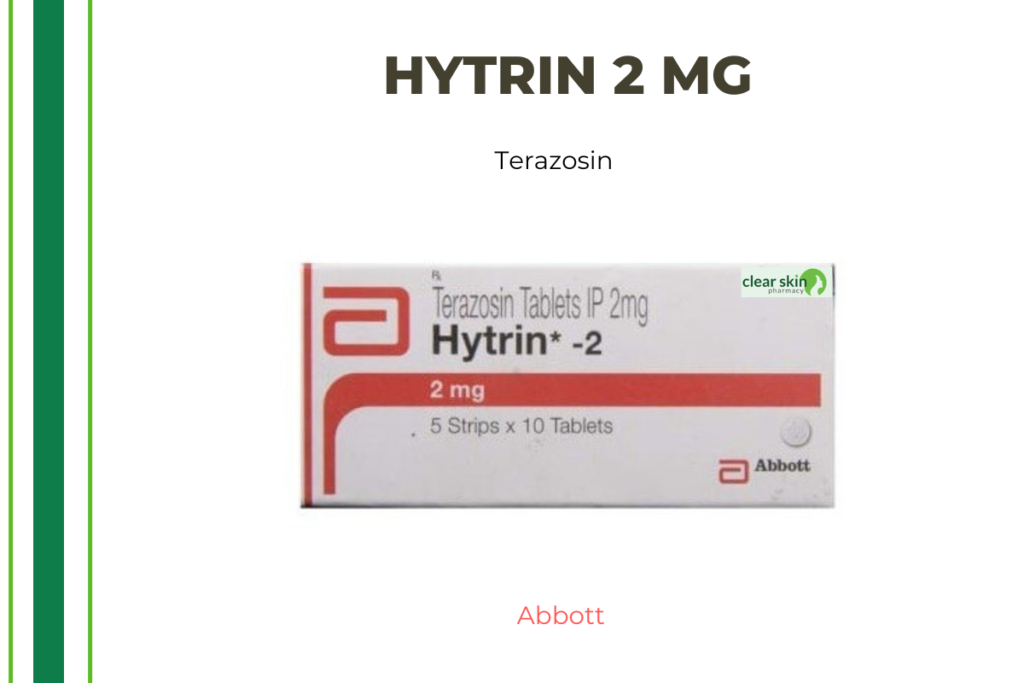
Medicinal Benefits
Primarily, 2 mg of Hytrin is used to treat hypertension (high blood pressure) and reduce the risk of future heart attack and stroke. In addition to treating modest prostate gland enlargement in males (known as Benign Prostate Hyperplasia) and heart failure, it is also used to treat mild prostate gland enlargement in women. It contains Terazosin, which dilates and relaxes blood vessels, decreases the heart’s workload, and improves the heart’s ability to circulate blood throughout the body. Consequently, it lowers blood pressure and lessens the likelihood of a subsequent heart attack or stroke.
Directions for Use
Take the 2 mg pill of Hytrin with or without meal, or as prescribed by your doctor. Completely swallow the tablet with a glass of water. Avoid crushing, chewing, and breaking.
Storage
Place in a cool, dry location out of direct sunlight.
Side Effects of Hytrin 2 mg
Drowsiness
Headache
Weakness
Dizziness
Priapism (prolonged erections)
Nausea
Feeling exhausted
Drug Warnings
Do not take 2 mg of Hytrin if you have an allergy to any of its components. Inform your doctor if you have low blood pressure (less than 90 mm of Hg), a history of heart attack, kidney illness, liver disease, are pregnant or planning to become pregnant, or are nursing before using Hytrin 2 mg. In addition, it is contraindicated for those who have aortic stenosis (heart valve problem). Hytrin 2 mg can enter breast milk, although the effects on the infant are unknown. Therefore, it is best to inform your doctor if you are breastfeeding and taking Hytrin 2 mg. Inform your doctor before undergoing eye surgery, especially cataract eye surgery. Before surgery, your doctor will discontinue Hytrin 2 mg.
Drug Interactions
Terazosin should not be administered to individuals with cardiogenic shock (when the heart fails to pump enough blood to the body), heart valve disease (stenosis), low blood pressure (hypotension), liver illness, renal disease, or heart failure due to a drug-disease interaction.
Terazosin should not be used with foods that are heavy in fat or cholesterol, or if you consume an excessive amount of salt in your diet (pickles, extra salt on salad).
Terazosin may interact with anti-cancer drugs (aldesleukin), anti-hypertensive drugs (benazepril, metoprolol, ramipril, hydrochlorothiazide), muscle spasm drugs (baclofen), antiparkinson drugs (levodopa, methyldopa), anti-epilepsy drugs (carbamazepine, phenytoin, phenobarbit (sildenafil, tadalafil).
Safety Advice
ALCOHOL
It is recommended that you avoid combining alcohol and Terazosin to avoid unwanted side effects such as a drop in blood pressure (hypotension).
PREGNANCY
Terazosin is classified as a pregnancy category C medication. Terazosin is generally not recommended as the initial treatment for hypertension in pregnancy due to a paucity of data supporting its usage. Consult your physician if you have high blood pressure during pregnancy.
BREAST FEEDING
Terazosin can enter breast milk, although its effects on infants are unknown. Therefore, it is best to inform your doctor if you are nursing and using Terazosin.
DRIVING
Drive with caution, as Terazosin typically induces sleepiness and impairs driving skills.
LIVER
Take Terazosin with caution, particularly if you have a history of liver illness. Your physician will adjust the dosage based on your medical condition and response to treatment.
KIDNEY
Take Terazosin with caution, especially if you have or have had a history of kidney illness. Your physician will adjust the dosage based on your medical condition and response to treatment.
Habit Forming: No
Diet & Lifestyle Advise
Maintain your weight within the BMI range of 19.5-24.9.
Regularly engage in physical activity or exercise for at least 150 minutes per week, or around 30 minutes on most days. This can help you reduce your elevated blood pressure by around 5 mm Hg.
Adopt a diet abundant in whole grains, fruits, vegetables, and low-fat dairy.
Most adults should limit their sodium chloride (table salt) consumption to 2300 mg per day or less than 1500 mg.
If consuming alcohol, one serving for women and two serves for men is recommended.
Quitting smoking is the best way to reduce the risk of cardiovascular disease.
Chronic stress can increase blood pressure. To manage stress and develop mindfulness, make an effort to enjoy and spend time with your loved ones.
Monitor your blood pressure daily, and if it fluctuates excessively, contact your doctor immediately.
Try to incorporate omega 3 fatty acid-containing foods and beverages into your everyday diet. You can also lower your blood pressure with low-fat cooking oils such as olive oil, soybean oil, canola oil, and coconut oil.
Special Advise
Terazosin consumption may induce dizziness. Driving should be avoided when using Terazosin.
This medicine may cause an abrupt drop in blood pressure, leading to dizziness. Changing your posture more slowly may help counteract this effect.
Regular blood pressure monitoring is required while taking Terazosin.
Additional Information: This item cannot be returned.
Disease/Condition Glossary
Blood pressure is the measurement of the force our heart uses to pump blood to all regions of the body. Hypertension is a chronic illness characterized by excessively high blood pressure. This disorder can cause the arteries (blood vessels) to stiffen, thereby reducing the blood and oxygen flow to the heart. High blood pressure can lead to angina and a heart attack (when blood supply to the heart is blocked). In addition, hypertension causes brain damage (stroke) and kidney failure. A blood pressure monitor can be used to diagnose high blood pressure. Blood pressure is determined by both the amount of blood your heart pumps and the resistance of your arteries to blood flow. The greater your blood pressure, the more blood your heart pumps and the smaller your arteries are. Even without symptoms, the damage to your blood vessels and heart can still be recognized.
The enlargement of the prostate gland is known as benign prostatic hyperplasia (BPH). It is a benign enlargement of the prostate gland produced by an excess of the hormone dihydrotestosterone in men. Most men get an enlarged prostate gland after age 50, which puts pressure on the urine bladder. It causes restricted or obstructed urine flow, frequent urination (particularly at night), and the sensation that the urinary bladder is not emptied.
FAQs
Terazosin contains the alpha-blocker Terazosin, which relaxes and dilates constricted blood arteries. This decreases the heart’s workload and improves its ability to pump blood throughout the body.
Before discontinuing the medication, you should contact your doctor and monitor your blood pressure for at least two weeks. Depending on your current blood pressure measurements, there is a chance that your doctor will reduce your medication dosage but not advise you to stop taking it. Occasionally, terazosin may produce priapism (prolonged erections). If you experience an erection that lasts more than four hours, you should contact your doctor and seek emergency medical care, since it can cause tissue scarring or erectile dysfunction if left untreated.
Please consult your physician prior to taking tadalafil with Terazosin, as this combination can drop your blood pressure (hypotension) and increase your risk of dizziness, lightheadedness, fainting, flushing, headache, and nasal congestion.

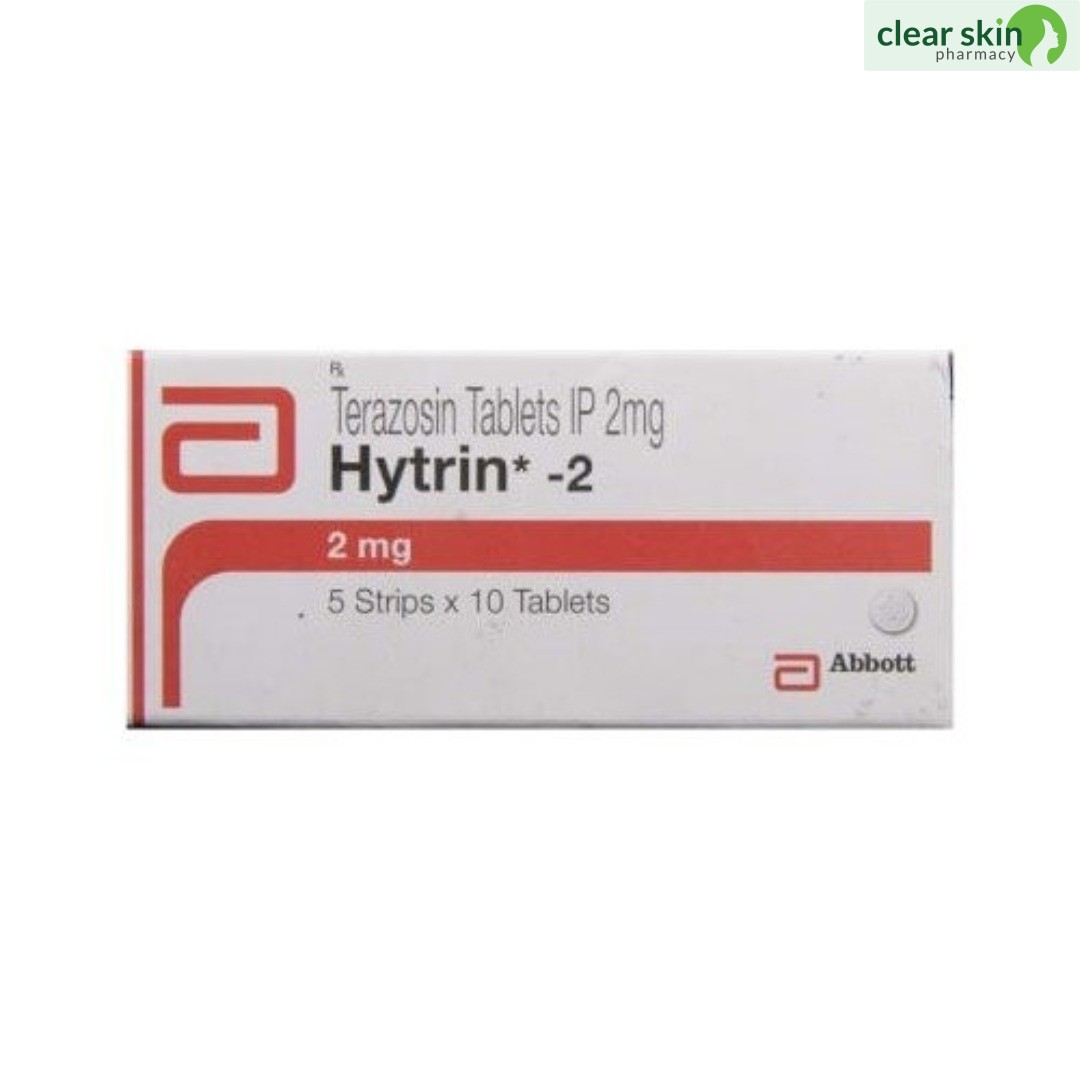
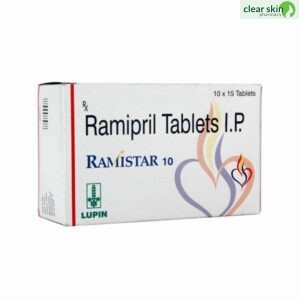

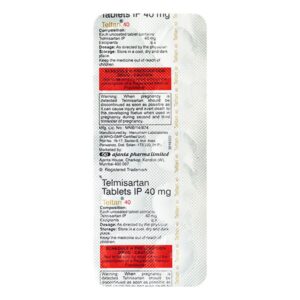

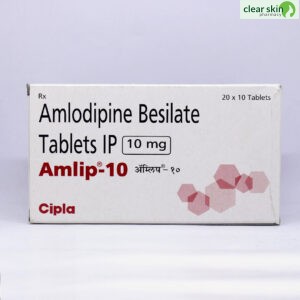
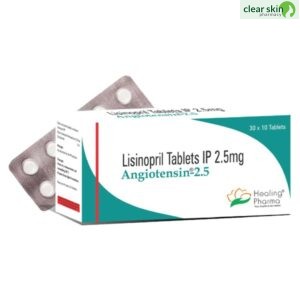
Be the first to review “HYTRIN 2 MG 10 tablets”